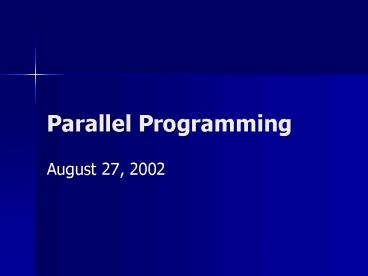Parallel Programming PowerPoint PPT Presentation
1 / 22
Title: Parallel Programming
1
Parallel Programming
- August 27, 2002
2
About the Course
- Lee McCauley
- 374 Dunn
- 678-2486
- t-mccauley_at_memphis.edu
3
About the Course
- Designing and Building Parallel Programs
- by Ian Foster, Addison Wesley (ISBN
0-201-57594-9) - Distributed Systems Concepts and Design 3rd
Ed (NOT IN BOOKSTORE YET) - by G. Coulouris, J. Dollimore, T. Kindberg,
Addison Wesley (ISBN 0-201-61918-0)
4
About the Course
- Schedule (on the handout)
- Evaluation
- Class Participation and Attendance (10)
- Case Study Reports (30)
- Final Project (60)
- Proposal (5) Due 9/24
- Written Draft (15) Due 11/19
- Final Written Paper (60) Due 12/3
- Oral Presentation (20) Due 12/3
5
Trends in Parallel Computing
6
Trends in Parallel Computing
7
Trends in Distributed Computing
- Seti_at_Home
- EoN
- Evolution_at_Home
- Distributed Particle Accelerator Design
- climateprediction.com
8
Fundamental Requirements
- Locality
- Concurrency
- Scalability
- Modularity
9
A Parallel Machine Model
- Each computer executes its own program
- May access local memory or send/receive messages
- Access to same node memory is less costly than
remote
10
Other Models
- MIMD (multiple instruction multiple data)
11
Other Models
- Shared memory multiprocessor
12
Other Models
- Local area network
13
Parallel Programming Model
- Programming von Neumann machines
- Theoretically doable in machine code
- More practical to use a high-level language
- Programming a parallel system is comparable
only worse - Which abstractions should we use?
14
Tasks and Channels
- A parallel computation consists of one or more
tasks that execute concurrently. The number of
tasks can change during execution - A task is carried out as a sequential program
using local memory with inports and outports to
interface with the environment - In addition to all local actions, a task can
send/receive messages, create a new task, and
terminate
15
Tasks and Channels
- A send operation is asynchronous while a receive
is synchronous - Outport/Inport pairs can be connected through
channels - Channels can be created, deleted, and referenced
in messages - Tasks can be mapped to physical processors in
various ways that does not affect the semantics
of the program
16
Lets Build a Bridge
17
Lets Build a Bridge
18
Mapping Independence
- The result of program execution is independent of
the location of tasks - Algorithms can be designed using tasks and
channels regardless of the actual number of
processors in a system scalability
19
Modularity
- The task/channel model is similar to OO
programming - Tasks encapsulate data and the code that runs on
that data - Channels are used in lieu of inter-object method
calls
20
Other Programming Models
- Message Passing
- Only slightly different than the task/channel
model and are, in practice, interchangeable - Implementations tend to create a number of
identical tasks (SPMD)
21
Other Programming Models
- Data Parallelism
- Applies the same operation to multiple elements
of a data structure - Compilers for this model tend to require
additional information (such as how to distribute
data over processors) and produce a SPMD
executable
22
Other Programming Models
- Shared Memory
- All processors share the same memory space
- Often easier to design but introduces several
additional worries - Grid-lock
- Program result is not necessarily deterministic

